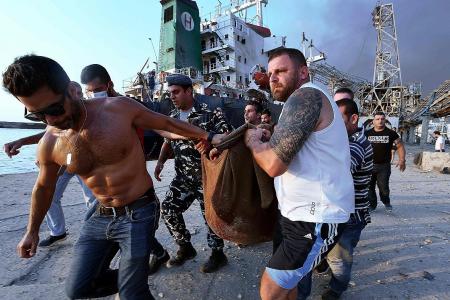Trump claims Beirut blast was attack, nations offer aid to Lebanon
US President quotes unnamed generals but two officials say it was unclear where he had received his information
BEIRUT: US President Donald Trump fuelled confusion hours after the Beirut blasts by casting the tragic incident as a possible attack when Lebanese leaders said it was a fire that spread to highly explosive material stored in warehouses at the port for years.
"The United States stands ready to assist Lebanon," Mr Trump said at a White House briefing, of Tuesday's explosion, which killed at least 135 people and injured thousands.
When asked later about his depiction of the explosion, Mr Trump said he had met some generals who felt the blast was not "some kind of a manufacturing explosion type of event".
He told reporters the unnamed generals "seem to think it was an attack. It was a bomb of some kind".
Two US officials, speaking on condition of anonymity, said it was unclear where Mr Trump was receiving his information from but that initial information did not appear to show the explosions were an attack.
Israel, which is still technically at war with Lebanon, has denied any responsibility and, like many countries, has offered humanitarian and medical aid to its neighbour.
Prime Minister Hassan Diab had called on "friendly countries" to support Lebanon, which is already reeling from its worst economic crisis in decades as well as the coronavirus pandemic.
Gulf states were among the first to respond, with Qatar announcing it would send field hospitals to ease pressure on Lebanon's strained medical system.
Emergency medical aid from Kuwait arrived in Beirut yesterday morning, as Jordan, Iran, Britain, Australia and other nations also pledged to help.
United Nations chief Antonio Guterres expressed his "deepest condolences ... following the horrific explosions in Beirut", which he said had also injured some U N personnel.
Meanwhile, anger was being directed towards Lebanon's ruling elite who have dominated politics for years and amassed their own wealth while failing to carry out the sweeping reforms necessary to solve the country's problems, the BBC reported.
The people must cope with daily power cuts, a lack of safe drinking water and limited public healthcare.
The Guardian quoted a shop worker, Mr Khaled Qudsi, as saying: "If any of them (politicians) will hold each other to account, I might change my mind.
"But you can bet your life that if any of their commercial interests were tied up to this accident, it will be swept away and blamed on a straw man."
The explosion also destroyed wheat stored in the port's granaries, prompting fears of a food crisis across a nation already suffering bread shortages.
Lebanon imports about 90 per cent of its wheat - used for making the country's staple flatbread - with the vast majority of shipments coming through the destroyed port. The port granaries held about 85 per cent of the country's cereals.
Lebanon's state-run national news agency quoted Mr Raoul Nehme, the Minister of Economy and Trade, as saying that all the wheat stored at the facility had been contaminated and could not be used.
But he insisted that Lebanon had enough wheat for its immediate needs.
Mr Nehme also said seven employees in the granaries were missing. - AFP, REUTERS
Get The New Paper on your phone with the free TNP app. Download from the Apple App Store or Google Play Store now




